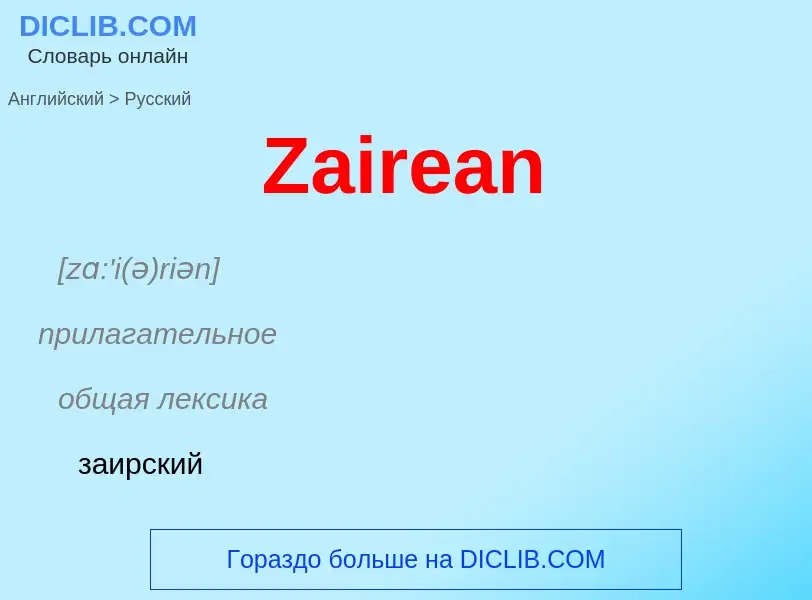Μετάφραση και ανάλυση λέξεων από την τεχνητή νοημοσύνη ChatGPT
Σε αυτήν τη σελίδα μπορείτε να λάβετε μια λεπτομερή ανάλυση μιας λέξης ή μιας φράσης, η οποία δημιουργήθηκε χρησιμοποιώντας το ChatGPT, την καλύτερη τεχνολογία τεχνητής νοημοσύνης μέχρι σήμερα:
- πώς χρησιμοποιείται η λέξη
- συχνότητα χρήσης
- χρησιμοποιείται πιο συχνά στον προφορικό ή γραπτό λόγο
- επιλογές μετάφρασης λέξεων
- παραδείγματα χρήσης (πολλές φράσεις με μετάφραση)
- ετυμολογία
Zairean - translation to ρωσικά
[zɑ:'i(ə)riən]
прилагательное
общая лексика
заирский
относящийся к Заиру
существительное
[zɑ:'i(ə)riən]
общая лексика
заирец
заирка
житель или уроженец Заира
Ορισμός
Βικιπαίδεια
Zaire (, also UK: ), officially the Republic of Zaire (French: République du Zaïre, [ʁepyblik dy zaiʁ]), was a Congolese state from 1971 to 1997 in Central Africa that was previously and is now again known as the Democratic Republic of the Congo. Zaire was, by area, the second-largest country in Africa (after Algeria), and the 11th-largest country in the world. With a population of over 23 million inhabitants, Zaire was the most populous officially Francophone country in Africa, as well as one of the most populous in Africa.
The country was a one-party totalitarian military dictatorship, run by Mobutu Sese Seko and his ruling Popular Movement of the Revolution party. Zaire was established following Mobutu's seizure of power in a military coup in 1965, following five years of political upheaval following independence from Belgium known as the Congo Crisis. Zaire had a strongly centralist constitution, and foreign assets were nationalized. The period is sometimes referred to as the Second Congolese Republic.
A wider campaign of Authenticité, ridding the country of the influences from the colonial era of the Belgian Congo, was also launched under Mobutu's direction. Weakened by the termination of American support after the end of the Cold War, Mobutu was forced to declare a new republic in 1990 to cope with demands for change. By the time of its downfall, Zaire was characterised by widespread cronyism, corruption and economic mismanagement.
Zaire collapsed in the 1990s, amid the destabilization of the eastern parts of the country in the aftermath of the Rwandan genocide and growing ethnic violence. In 1996, Laurent-Désiré Kabila, the head of the Alliance of Democratic Forces for the Liberation of Congo (AFDL) militia, led a popular rebellion against Mobutu. With rebel forces successfully making gains westward, Mobutu fled the country, leaving Kabila's forces in charge as the country restored its name to the Democratic Republic of the Congo the following year, and he died less than four months later while in exile in Morocco.


![Mobutu]] was the president of Zaire from 1965 to 1997. Mobutu]] was the president of Zaire from 1965 to 1997.](https://commons.wikimedia.org/wiki/Special:FilePath/Mobutu.jpg?width=200)
